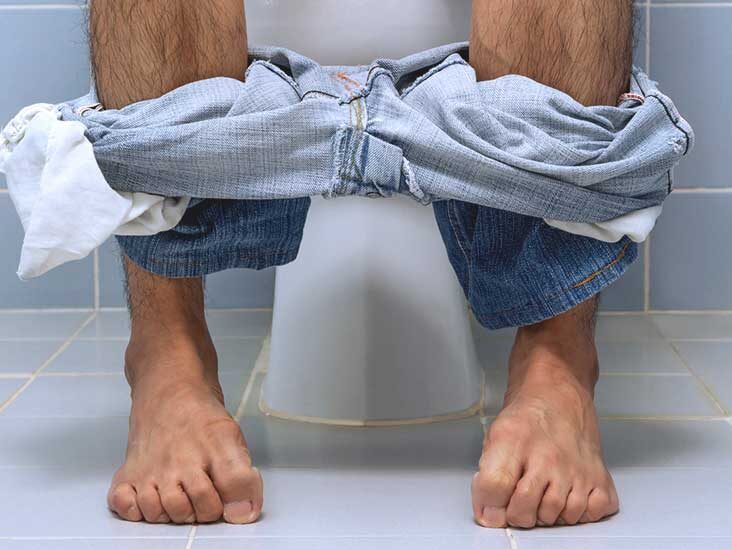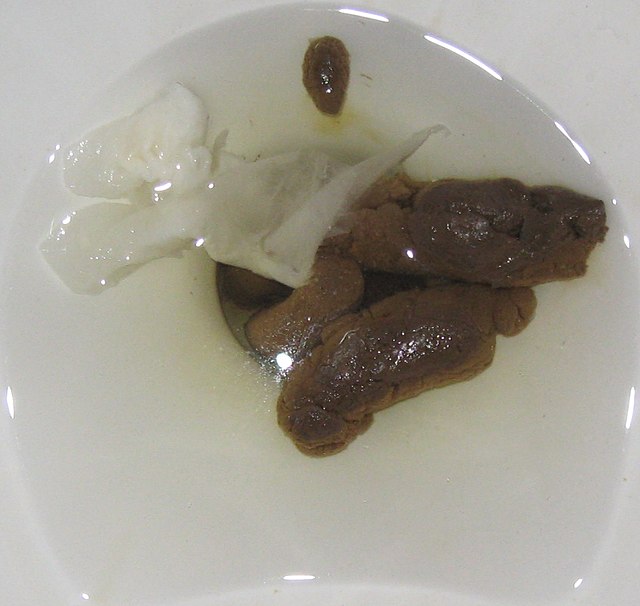Sticky Poop - Understanding The Causes And Remedies
Sticky poop is a common gastrointestinal issue that can affect individuals of all ages. It refers to the fecal matter that is difficult to pass and may stick to the toilet bowl or your anus, making it difficult to wipe cleanly. This condition can be an indication of various health problems, and it is essential to identify the underlying cause and address it.
Author:Suleman ShahReviewer:Han JuApr 07, 202329.6K Shares925.3K Views

Sticky poopis a common gastrointestinal issue that can affect individuals of all ages. It refers to the fecal matter that is difficult to pass and may stick to the toilet bowl or your anus, making it difficult to wipe cleanly. This condition can be an indication of various healthproblems, and it is essential to identify the underlying cause and address it.
Top 5 Facts About Sticky Poop
- Sticky poop is often a sign of constipation, which occurs when the stool moves too slowly through the digestive tract, allowing more water to be absorbed and resulting in harder, drier stool that is more difficult to pass.
- Poor diet, lack of exercise, dehydration, certain medications, and underlying medical conditions can all contribute to the development of sticky poop.
- Straining to pass hard, sticky stool can cause anal fissures, hemorrhoids, and other rectal injuries, which can lead to pain, discomfort, and even bleeding.
- Eating a diet rich in fiber and staying hydrated can help prevent sticky poop by promoting healthy bowel movements and preventing constipation.
- If sticky poop persists despite lifestyle changes, it's important to seek medical attention to rule out underlying medical conditions that may require treatment. A healthcare provider may recommend tests like a colonoscopy or stool analysis to determine the root cause of the problem.
Causes Of Sticky Poop
Sticky poop can occur due to various reasons, and some of the most common ones include:
- Dehydration - When the body is dehydrated, it absorbs more water from the colon, leading to hard and sticky stools.
- Poor diet - A diet that is low in fiber and high in processed foods, sugar, and fat can lead to sticky poop.
- Irritable Bowel Syndrome (IBS) - IBS is a digestive disorder that can cause a range of symptoms, including sticky poop.
- Food allergies or intolerances - Some individuals may be intolerant to certain foods, such as dairy or gluten, leading to sticky poop.
- Medications - Certain medications, such as antacids and opioids, can cause constipation and lead to sticky poop.
- Gastrointestinal disorders - Various gastrointestinal disorders, such as Crohn's disease and ulcerative colitis, can lead to sticky poop.
Symptoms Of Sticky Poop
The symptoms of sticky poop may vary depending on the underlying cause. However, some common symptoms include:
- Difficulty passing stools
- Hard, lumpy, and sticky stools
- Abdominal pain and discomfort
- Feeling of incomplete bowel movements
- Bloating and gas
- Anal fissures and hemorrhoids
- Rectal bleeding
Treatment For Sticky Poop
Treatment for sticky poop may depend on the underlying cause, and some common treatment options include:
- Increase fluid intake - Drinking plenty of water and other fluids can help soften the stool and make it easier to pass.
- Dietary changes - Increasing fiber intake and reducing processed foods, sugar, and fat can help regulate bowel movements.
- Medications - Over-the-counter laxatives, stool softeners, and fiber supplements can help alleviate constipation and sticky poop.
- Probiotics- Probiotics can help improve gut health and regulate bowel movements.
- Medical intervention - If the sticky poop is caused by an underlying medical condition, such as IBS or Crohn's disease, medical intervention may be necessary.
Prevention Of Sticky Poop
The following tips may help prevent sticky poop:
- Drink plenty of water and other fluids to stay hydrated.
- Eat a diet rich in fiber and whole foods.
- Exercise regularly to promote bowel movements.
- Avoid foods that you may be intolerant to or allergic to.
- Manage stress, as stress can affect bowel movements.
The Role Of Hydration In Preventing Sticky Poop
Staying hydrated is an essential part of preventing sticky poop and promoting healthy bowel movements. When the body is dehydrated, it absorbs more water from the colon, leading to hard, sticky stools that are difficult to pass. Drinking plenty of water and other fluids can help soften the stool and make it easier to pass, reducing the risk of constipation and sticky poop. It is recommended to drink at least 8 glasses of water per day and to consume water-rich foods like fruits and vegetables to stay properly hydrated.
The Link Between Sticky Poop And Gastrointestinal Disorders
Sticky poop can be a symptom of various gastrointestinal disorders, including irritable bowel syndrome (IBS), Crohn's disease, ulcerative colitis, and others. These conditions can cause inflammationand other changes in the digestive tract that can lead to sticky poop and other symptoms. Treatment for sticky poop caused by a gastrointestinal disorder may involve medication, dietary changes, stress management, and other interventions as recommended by a healthcare provider.
Natural Remedies For Sticky Poop Relief
In addition to traditional medical treatments, some people may find relief from sticky poop symptoms through natural remedies. These remedies can include eating a diet rich in fiber and whole foods, drinking plenty of water, exercising regularly, and using herbal remedies like aloe vera or psyllium husk. Probiotics, magnesium supplements, and other natural supplements may also help alleviate symptoms of sticky poop. However, it is important to speak with a healthcare provider before trying any new remedies to ensure they are safe and appropriate for your individual needs.
The Role Of Stress In Causing Sticky Poop
Stress can play a significant role in the development of sticky poop. When the body is under stress, it releases hormones like adrenaline and cortisol that can affect the digestive system, leading to constipation, bloating, and other symptoms. Chronic stress can also lead to inflammation and changes in gut bacteria, which can further contribute to sticky poop. Managing stress through techniques like meditation, yoga, and deep breathing exercises may help alleviate symptoms of sticky poop and promote overall digestive health.
Medications That Can Cause Sticky Poop As A Side Effect
Certain medications can cause sticky poop as a side effect, including opioids, antacids, and iron supplements. These medications can slow down the digestive system and make it more difficult for stool to pass through the colon, leading to constipation and sticky poop. If you are experiencing sticky poop symptoms while taking medication, it is important to speak with your healthcare provider to determine whether the medication may be contributing to the issue and whether alternative treatments are available.
How To Manage Sticky Poop During Pregnancy
Pregnancy can cause hormonal changes that can affect the digestive system, leading to constipation and sticky poop. Additionally, the growing fetus can put pressure on the colon, making it more difficult to pass stool. To manage sticky poop during pregnancy, it is important to stay hydrated, eat a healthy diet rich in fiber, and exercise regularly. Over-the-counter laxatives and stool softeners may also be used under the guidance of a healthcare provider. It is important to speak with your healthcare provider about any concerns or persistent symptoms of sticky poop during pregnancy.
People Also Ask
Is Sticky Poop A Sign Of Colon Cancer?
Sticky poop is not typically a sign of colon cancer, but it is important to be aware of other potential symptoms such as changes in bowel habits, blood in the stool, abdominal pain, and unexplained weight loss. If you experience any of these symptoms, it is important to speak with your healthcare provider.
What Is The Consistency Of Sticky Poop?
Sticky poop can vary in consistency, but it is typically described as having a soft or loose texture that sticks to the toilet bowl or wipes. The stool may also appear greasy or oily due to an excess of fat content.
Can Sticky Poop Be A Symptom Of Lactose Intolerance?
Yes, sticky poop can be a symptom of lactose intolerance because the condition can cause malabsorption of lactose, which leads to undigested lactose reaching the large intestine. This can result in increased mucus production, flatulence, and sticky or loose stools.
What Is The Connection Between Sticky Poop And Pancreatic Insufficiency?
Pancreatic insufficiency occurs when the pancreas is unable to produce enough digestive enzymes to properly break down food. This can lead to malabsorption of nutrients and sticky or greasy stools due to the excess fat content. In some cases, pancreatic insufficiency can be caused by underlying conditions such as cystic fibrosis or chronic pancreatitis.
Conclusion
Sticky poop can be a frustrating and uncomfortable condition that can affect an individual's quality of life. It is essential to identify the underlying cause and address it appropriately to prevent long-term complications. If you are experiencing sticky poop or any other digestive issues, it is recommended to speak to a healthcare professional for proper diagnosis and treatment.
Jump to
Top 5 Facts About Sticky Poop
Causes Of Sticky Poop
Symptoms Of Sticky Poop
Treatment For Sticky Poop
Prevention Of Sticky Poop
The Role Of Hydration In Preventing Sticky Poop
The Link Between Sticky Poop And Gastrointestinal Disorders
Natural Remedies For Sticky Poop Relief
The Role Of Stress In Causing Sticky Poop
Medications That Can Cause Sticky Poop As A Side Effect
How To Manage Sticky Poop During Pregnancy
People Also Ask
Conclusion

Suleman Shah
Author
Suleman Shah is a researcher and freelance writer. As a researcher, he has worked with MNS University of Agriculture, Multan (Pakistan) and Texas A & M University (USA). He regularly writes science articles and blogs for science news website immersse.com and open access publishers OA Publishing London and Scientific Times. He loves to keep himself updated on scientific developments and convert these developments into everyday language to update the readers about the developments in the scientific era. His primary research focus is Plant sciences, and he contributed to this field by publishing his research in scientific journals and presenting his work at many Conferences.
Shah graduated from the University of Agriculture Faisalabad (Pakistan) and started his professional carrier with Jaffer Agro Services and later with the Agriculture Department of the Government of Pakistan. His research interest compelled and attracted him to proceed with his carrier in Plant sciences research. So, he started his Ph.D. in Soil Science at MNS University of Agriculture Multan (Pakistan). Later, he started working as a visiting scholar with Texas A&M University (USA).
Shah’s experience with big Open Excess publishers like Springers, Frontiers, MDPI, etc., testified to his belief in Open Access as a barrier-removing mechanism between researchers and the readers of their research. Shah believes that Open Access is revolutionizing the publication process and benefitting research in all fields.

Han Ju
Reviewer
Hello! I'm Han Ju, the heart behind World Wide Journals. My life is a unique tapestry woven from the threads of news, spirituality, and science, enriched by melodies from my guitar. Raised amidst tales of the ancient and the arcane, I developed a keen eye for the stories that truly matter. Through my work, I seek to bridge the seen with the unseen, marrying the rigor of science with the depth of spirituality.
Each article at World Wide Journals is a piece of this ongoing quest, blending analysis with personal reflection. Whether exploring quantum frontiers or strumming chords under the stars, my aim is to inspire and provoke thought, inviting you into a world where every discovery is a note in the grand symphony of existence.
Welcome aboard this journey of insight and exploration, where curiosity leads and music guides.
Latest Articles
Popular Articles
